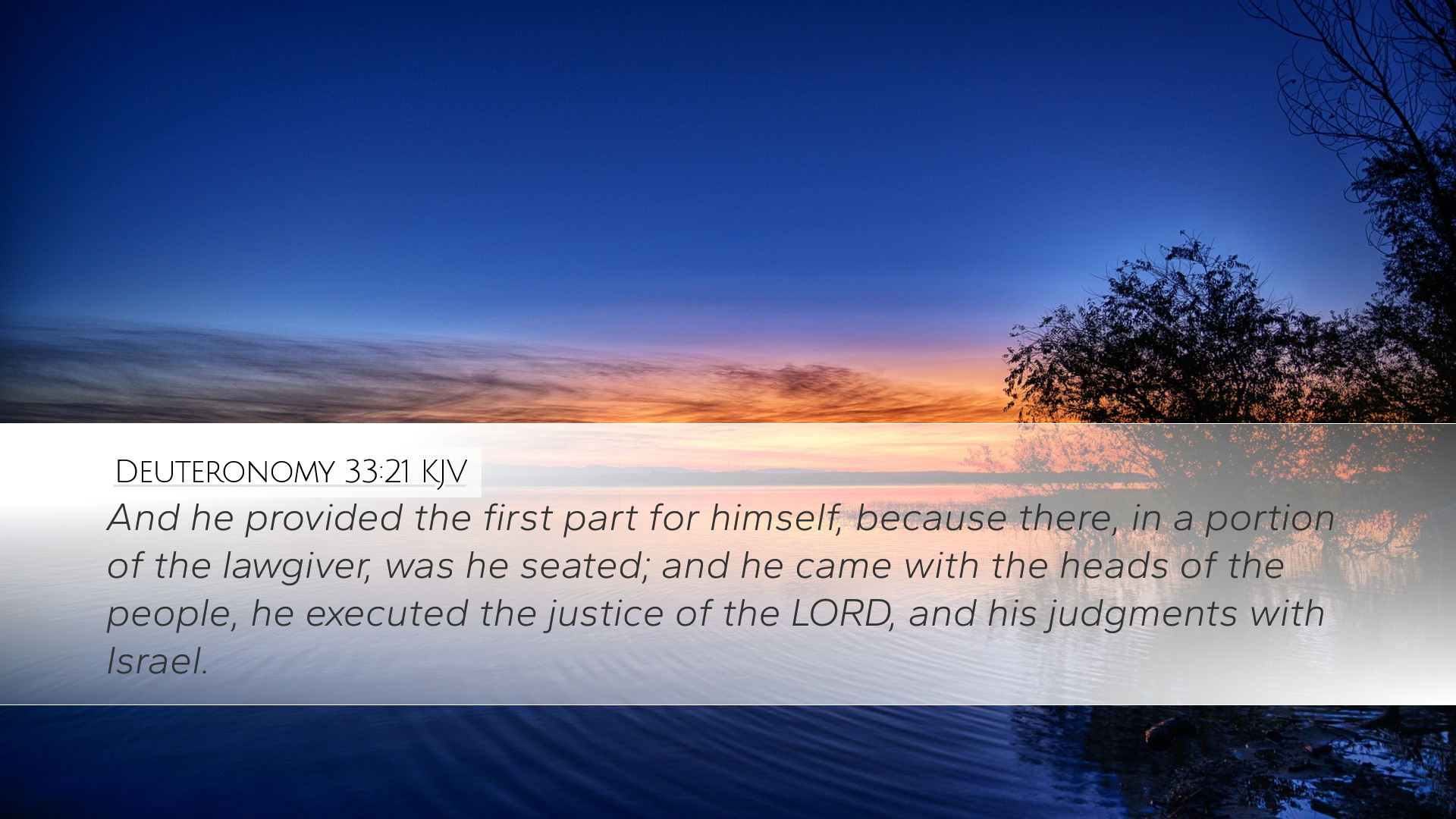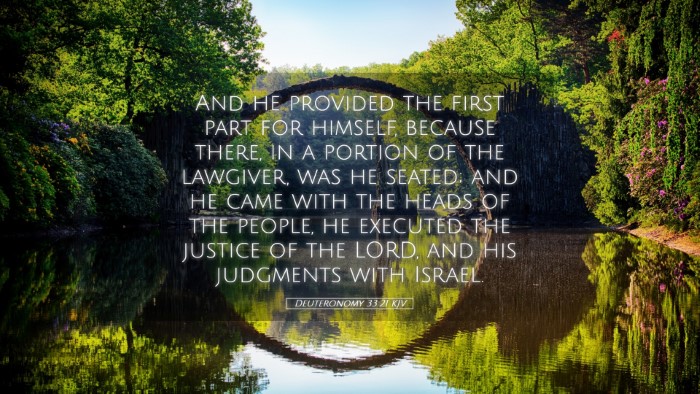Bible Commentary on Deuteronomy 33:21
Verse Context: Deuteronomy 33:21 states, "And he provided the first part for himself, because there, in a commander's share, was the lawgiver's portion reserved." This verse is part of Moses' final blessings to the tribes of Israel before his death. It reflects both the historical account and the spiritual significance of Israel’s division of land among the tribes.
Summary of Insights
The commentary on this verse brings together various insights that speak to its theological, historical, and practical implications. Combining thoughts from Matthew Henry, Albert Barnes, and Adam Clarke, we will explore its multifaceted meanings.
The Importance of the Firstborn's Blessing
Matthew Henry's Perspective: Henry places great emphasis on the significance of the firstborn's blessing in ancient Hebrew culture. The phrase "he provided the first part for himself" can be understood as a reference to the special status granted to the tribe of Reuben, being the firstborn. This blessing conveys a dual message of honor and responsibility, underscoring the idea that with privilege comes an expectation of leadership and guidance.
Understanding Commanders and Lawgivers
Albert Barnes' Analysis: Barnes elaborates on the terms "commander" and "lawgiver." He interprets them as indicating the role of governance and adherence to divine law. In context, these titles suggest that the land inheritance is more than a mere territorial possession; it signifies a call to upholding divine principles and social order. Therefore, the first part set aside signifies a model for how leadership should resemble divine authority, a call to righteousness among the people.
The Significance of Land Allocation
Adam Clarke's Exegesis: Clarke provides a detailed analysis of land allocation among Israel's tribes, emphasizing that each portion was divinely assigned to fulfill God's covenantal promise. The mention of a "commander's share" suggests not only a physical possession but also a spiritual inheritance to fulfill divine commandments. Land thus acts as a medium through which spiritual duties can be expressed.
The Role of the Tribe of Reuben
- Historical Significance: The tribe of Reuben, as the firstborn, was expected to lead and protect the others. The blessing issued by Moses acknowledges their role, but it also acts as a reminder of past failures and future responsibilities.
- Inheritance and Responsibility: This inheritance is marked by the weight of social responsibility. Each tribe, particularly Reuben, was called not just to occupy land but to ensure law and order among the Israelites.
- Symbol of Spiritual Authority: The unique allocation for the tribe of Reuben signifies that leadership carries spiritual weight; blessed upon them is the duty to command adherence to the covenant established by God.
Theological Implications
Beyond historical and cultural contexts, this verse stimulates theological reflection on modern leadership, covenant, and divine sovereignty. How do the roles of 'commander' and 'lawgiver' translate into contemporary faith contexts? The insights gleaned from this passage inspire leaders and scholars to reflect on their responsibilities as spiritual guides.
Leadership in Modern Contexts
The commentary invites pastors and theologians to consider the essence of godly leadership. Just as Reuben’s position came with responsibilities, so too should modern leaders be reminded of their roles in guiding their communities according to God's word.
Righteousness in Authority
- Integrity: Leaders must embody integrity and righteousness, reflecting the character of the divine lawgiver.
- Servant Leadership: The example of Reuben challenges contemporary leaders to leverage their privileges to serve, not dominate.
- Accountability: There is a call to accountability in leadership. The blessings of God over one's leadership should be met with a commitment to serve the community faithfully.
Conclusion
In conclusion, Deuteronomy 33:21 encapsulates profound lessons in leadership, responsibility, and obedience to God's law. By synthesizing perspectives from prominent public domain commentaries, we grasp the holistic approach needed in interpreting Scripture. The blessings given by Moses serve as an enduring message that resonates throughout generations, reminding today’s leaders of their sacred duties within their communities.


